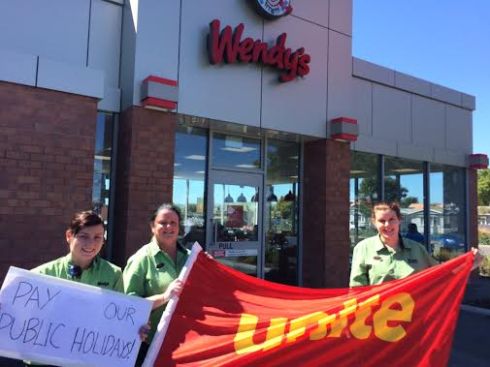(The following history was prepared as part of the contribution by Unite Union to the international fast food workers meeting in New York in early May. Unions officials and workers were fascinated by the story we were able to tell which in many ways was a prequel to the international campaign today.)
All four parts of this series can be downloaded as a single PDF file from here
Part Two
Part Three
Part Four
2005 fast food recruitment drive
Beginning in May 2005, we launched a recruitment drive at all the main fast food restaurants in preparation for the launch of the public campaign. This included Restaurant Brands (KFC, Pizza Hut and Starbucks), McDonald’s (including all franchisees), BK, Wendy’s and Red Rooster (since closed). We negotiated “access protocols” with each company. We had a legal right to access to talk to staff. The companies were determined to keep us from going back of house to talk to staff during work hours, so we accepted the “compromise” that a manager would send each staff member out for a one-on-one chat for a few minutes. We already knew that this “compromise” would enable us to recruit in the hundreds.
We had the assistance of a very smart young volunteer, Simon Oosterman, who brought in a youthful tech-savvy that combined well with Matt McCarten’s political party campaign experience and my own social movement organising. Two other central organisers of the campaign still with Unite today were Joseph Carolan and Tom Buckley. At the beginning of 2006, John Minto – an iconic figure of the anti-apartheid movement in New Zealand – gave up his teaching job and joined the Unite project. As well as his organising and negotiating skills, Minto was a household name and also had a weekly column in the Christchurch daily paper. Minto left Unite in 2012 to concentrate on building the Mana Movement.

SuperSizeMyPay.Com
Oosterman designed the website and publicity materials that became SuperSizeMypay.com. In doing so, we maxed out our personal credit cards and homes were refinanced. A bus was bought with a kick-arse sound system able to be attached to the roof.
We had identified the 3 key issues for which we would negotiate in each and every collective agreement and which we considered essential:
Continue reading →
 A major survey of fast food workers in New Zealand has
A major survey of fast food workers in New Zealand has











